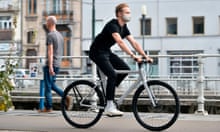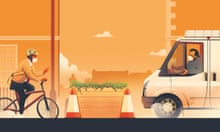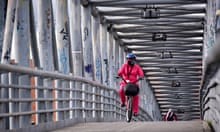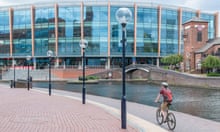The “cyclist-first” city of Utrecht is constructing the Netherlands’ first high-density, car-free residential district for more than 12,000 people, making it one of the largest of its type in the world.
The 24-hectare site, located between two canals in the middle of the city, is a business park but by 2024 it is hoped the area will enhance Utrecht’s reputation as a bicycling capital of Europe.
The Dutch city built the Netherlands’ first bike lane in 1885 and last year it unveiled the world’s largest multistorey bike park area with space to accommodate 12,500 bicycles of all shapes and sizes.
The new-build Merwede district of 6,000 homes is expected to be serviced by about 20,000 bicycles.
“It should be easier to get a bike than it should be to get a car,” the project’s architect, Marco Broekman, said of the philosophy behind the development.
Construction on the first homes is expected in 2022. Two new primary schools and health centres, a high school, a sports centre and shops and businesses will also be built on the site, which will be accessible to the rest of the city, the fourth largest in the Netherlands, by bike lanes and trams.
Only four dead-end roads of 60 metres in length will protrude into the car-free idyll to allow “logistical” access for petrol-guzzling vehicles into the district’s outer fringes.
Underground garages alongside the “logistical roads“ will offer 1,800 parking spaces for those who cannot quit their addiction to the car, equating to one car for every three households.
The parking spaces will be available for use at a heavy cost and are to remain unassigned to dissuade use. Alongside them will be 300 shared cars for residents’ use. The closest alternative parking will be 3km away.
For shopping deliveries, and for the removal of rubbish from the new car-free streets, it is expected small electric vehicles will be deployed to trundle from the “logistical roads” to the homes and back.
The Merwede district will boast the largest underground heat and cold storage facility in the Netherlands, using water from the Merwedekanaal to cool it. The roofs of the district’s buildings will be filled with greenery or solar panels, which would cover three hectares if put side to side.
Broekman said he and his collaborators had been inspired by smaller-scale projects in Paris and a 600-home development in Amsterdam’s Gemeente Waterleiding district, but that he believed the scale of the project was unique.
He said: “By having this car-free area, we can design spaces without the straitjacket rules of the car, and thus focus on essentials for a high-density area, which is the quality of public space, city on eye level, green, biodiversity, climate adaptation and meeting places for social interaction.”
Kees Diepeveen, the alderman responsible for the city district, known as the Merwedekanaalzone, said Utrecht was rapidly growing and the behaviour of its citizens was changing as quickly.
He said: “We have the highest number of shared cars [per capita] in the Netherlands. It is amazing to see how the average household is changing its habits. This especially counts for the younger generations.”
Merwede, a third of whose land is owned by the municipality with the rest belonging to private entities, follows the example of Vauban in Germany, which is home to more than 5,000 people.
Residents there must confirm once a year that they do not own a car or otherwise purchase a space in a multistorey car park on the edge of the district. A space was initially provided for every two households, but car ownership has fallen over time, and many of spaces now lie empty.






